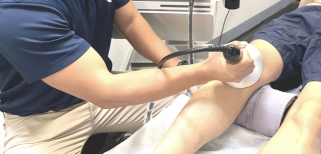




Health Information



Focus Shockwave Therapy Frequently Asked Question

Focus Shockwave Therapy Frequently Asked Question (by Sportsperformance Physiotherapy)
Shockwave Therapy Frequently Asked Question
Shockwave Therapy, also known as extracorporeal Shockwave Therapy (ESWT), is a non-invasive medical procedure that delivers sound waves to cause deep cell stimulation that releases growth factors responsible for tissue regeneration and aid recovery of different types of musculoskeletal conditions. There are two types of shockwave therapy, Radial pressure and Focus. This FAQ is written to answer some of the most commonly asked questions about Focus Shockwave Therapy listed below:
-
What are the benefits of focus Shockwave Therapy?
-
How successful is the focus shockwave therapy?
-
Is Focus Shockwave Therapy safe?
-
How long would each session take, and how many sessions are needed?
-
Is Focus Shockwave Therapy painful?
-
Would more depth penetrating have a better effect?
-
Does a longer time per session have a better result?
-
Are there any contraindications that shockwave therapy not recommended?
What are the benefits of focus Shockwave Therapy?
- No anaesthesia
- Non-invasive / non-surgical – no recovery time is needed
- Fast Treatment – 10-15 minutes per session, around 3- 5 sessions needed (Depending on the condition of the patients and the symptoms that are treated)
- Less discomfort than Radial Pressure shockwave
- No medication
How successful is the focus shockwave therapy?
Regarding specific lesions supported with research evidence, tendinopathies are the most frequently reported, though open wounds and bone union (delayed and non-union) problems are also found. Of the chronic and especially recalcitrant tendon lesions, those with the strongest research and anecdotal support include:
- Plantar fasciitis
- Achilles tendinopathy
- Patellar tendinopathy
- Tennis and Golfers elbow (medial and lateral Epicondlyar Tendinopathy)
- Biceps tendinopathy
- Supraspinatus tendinopathy
Other include trochanteric bursitis, back pain/sciatica, and piriformis syndrome, though it is appreciated that this is not a tendinopathy-type lesion.
Is Focus Shockwave Therapy safe?
Yes, very safe! FSWT has no recorded long-term adverse effects reported till now. Though there were some reports of minor bruises and skin irritations which resided for a few days
How long would each session take, and how many sessions are needed?
Our Physiotherapist will base on each patient’s condition and no. of treatment areas to determine the length of each session. However, give and take, each session takes about 10-15 minutes for just the shockwave treatment. For the first session, since a thorough consultation is needed to evaluate the patient's situation, the entire session would be a bit longer.
And also, in most cases, shockwave therapy is part of the whole physiotherapy treatment instead of the only treatment modality. Our physiotherapy session in Sportsperformance is a 40 minutes session. As for how many sessions, this also depends on the patient's condition. Averaging speaking three up to seven sessions would be needed.
Is Focus Shockwave Therapy painful?
Since the principle of focus shockwave is to focus its highest energy at the desired injured location (which means it would “skip” your skin), you won’t feel much ‘superficial’ discomfort but moderate pain (7 out of 10 at most) on the targeted area.
Would more depth penetrating have a better effect?
The principle of the shockwave is that the shockwave has to be able to reach the troubled tissues. Thus, over-shotting the shockwave beyond the desired depth might not be able to stimulate the desired pain spot, and adverse effects might occur.
Does a longer time per session have a better result?
Shockwave is not measured by time but by doses/charges per session. During the session, your physiotherapist will adjust the machine intensity to ensure that the troubled areas receive the required dosages/charges.
Are there any contraindications that shockwave therapy not recommended?
Following is a non-exhaustive list of conditions that Sportspeformance Physiotherapy do not recommend our patients to undergo shockwave therapy:
- The treatment area is close to the lung
- Haemophiliac patients or patients undergoing anticoagulant therapy
- If the treatment area is infected
- Due to limited studies, epiphyseal regions, joint replacements, and cancer patients are not recommended to undergo shockwave therapy.
If you want to learn more about the focus shockwave therapy services that Sportsperformance Physiotherapy provides, please visit our service page on focus shockwave therapy.
More about the differences between focus shockwave versus radial shockwave therapy here.



